Sugar is one of the most dangerous ingredients on the market. It’s addictive, added to almost every processed food, and will make you overweight, depressed and sick if you eat too much. In fact, Americans eat close to 130 pounds of the stuff per person per year (4 times more than the recommended daily allowance), likely because it is so addictive. That’s why it’s exciting to know there are alternative sweeteners made in nature, like “stevia,” that don’t wreak havoc on your health – or do they? Is Stevia safe? That’s what I went on a quest to find out. Here’s what happened…

What Is Stevia?

For those of you that are hearing about stevia for the first time, it is a plant that is typically grown in South America, and while its extract is 200 times sweeter than sugar, it does not raise blood insulin levels. That’s what makes it so popular. However in 1991 the FDA refused to approve this substance for use due to pressure from makers of artificial sweeteners like Sweet n’ Low and Equal (a one billion dollar industry). But in 2008, the FDA approved the use of rebaudioside compounds that were derived from the stevia plant by Coca-Cola (Cargill) and PepsiCo – hmmm doesn’t that sound suspicious? Not until a major food company got involved did stevia become legal, and only after it had been highly processed using a patentable chemical-laden process…so processed that Truvia (Coca-Cola’s branded product) goes through about 40 steps to process the extract from the leaf, relying on chemicals like acetone, methanol, ethanol, acetonitrile, and isopropanol. Some of these chemicals are known carcinogens (substances that cause cancer), and none of those ingredients sound like real food, do they?
The whole leaf stevia that you can grow in your backyard (and has been used for centuries in countries like Brazil and Paraguay) remains a non-approved food additive by the FDA. However, rebaudioside A (the stevia extract) that was approved by the FDA has not been used for centuries and long term human health impacts have not been studied and are still unknown. The sweetener/sugar industry wields powerful influence over what is ultimately approved at the FDA, and this is just another example where they are influencing decisions that don’t make sense. How can a chemically derived extract be deemed safe in processed food and a plant from mother nature not?
What Kind Of Stevia To Avoid
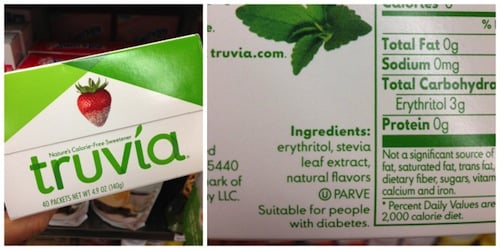
The 40-step patented process used to make Truvia should make you want to steer clear of this stevia product alone, but there are two other concerning ingredients added (not only to Truvia but other stevia products as well). First, erythritol is a naturally occurring sugar that is sometimes found in fruit, but food manufacturers don’t actually use the natural stuff. Instead they start with genetically engineered corn and then go through a complex fermentation process to come up with chemically pure erythritol. Check out the manufacturing process below:
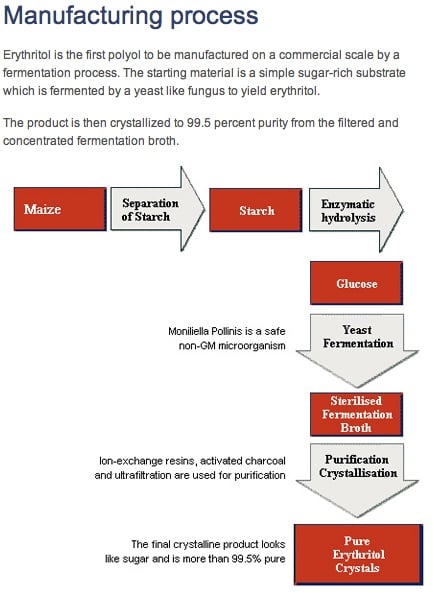
Credit: Cargill
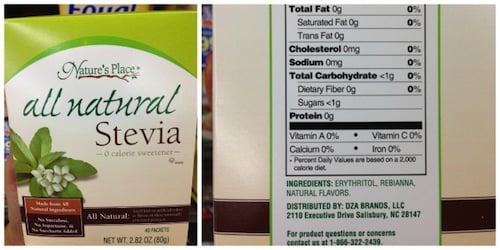
“Natural flavors” is another ingredient added to powdered and liquid stevia products, likely due to the fact that once the stevia leaf is processed it can develop a metallic taste. Manufactured natural flavor is contributing to what David Kessler (former head of the FDA) calls a “food carnival” in your mouth. This makes it difficult to stop eating or drinking because the flavors they have synthesized will trick your mind into wanting more and more. When companies use manufactured flavor, they are literally “hijacking” your taste buds one-by-one; that’s why I recommend putting products that contain “natural flavors” back on the shelf.
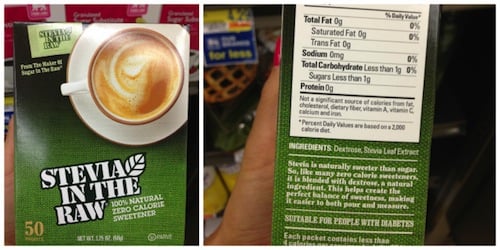
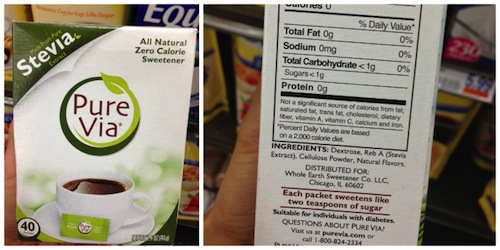
“Stevia in the Raw” sounds pure and natural, but when you look at the ingredients the first thing on the label is “dextrose” – so it’s certainly not just stevia in the raw. And Pepsi Co’s “Pure Via,” also pictured above, isn’t exactly pure either with this ingredient being first on the label, too. Dextrose is a sweetener that’s also derived from genetically engineered corn and has a long complicated manufacturing process, just like erythritol.
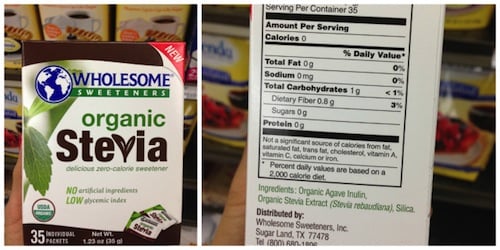
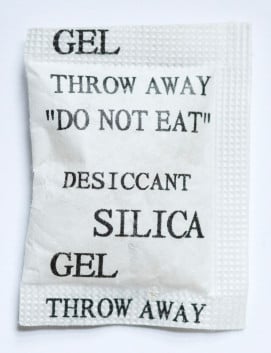
Even certified organic stevia can have sneaky ingredients added, like this one above which has more organic agave inulin than the stevia extract itself. Agave inulin is a highly processed fiber derivative from the blue agave plant. Also on the ingredient list is an item you are probably familiar with from those little packets sometimes found in boxed goods – silica (pictured). It is added to improve the flow of powdery substances and is the same ingredient that helps strengthen concrete and creates glass bottles and windowpanes. It may cause irritation of the digestive tract (if eaten) and irritation of the respiratory tract (if accidentally inhaled). While it is non-toxic and probably won’t kill you in small quantities, it’s definitely not a real food ingredient I would cook with or that I want to be putting in my body.
How To Choose The Right Kind Of Stevia
Luckily there are ways to enjoy this sweet leaf closer to it’s natural state… because let’s be honest, the no-calorie artificial sweeteners out there are really dreadful, and no one should consume them (check this post for the low down on those). So here’s what you can do:
- Buy a stevia plant for your garden (luckily it’s totally legal!) or purchase the pure dried leaves online – you can grind up them up using a spice grinder (or use a mortar and pestle) for your own powdered stevia.
- When choosing products already sweetened with stevia, look for “whole leaf stevia” on the ingredient label. For example one of my favorite protein powders is made with “whole stevia leaf” instead of rebaudioside a or stevia extract.
- Add fresh or dried leaves directly to tea or drinks for natural sweetness (note the straight stevia leaves are only 30-40 times sweeter than sugar, vs. 200 times using the extract).
- Make your own liquid stevia extract (see graphic below for recipe).
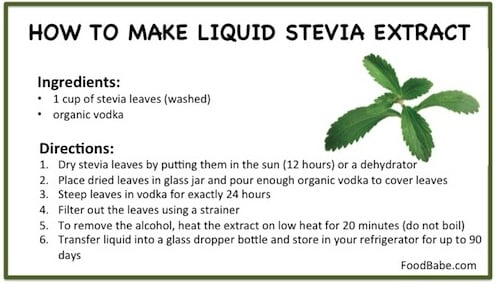
- If you are not up for getting a stevia plant of your own or making your own extract, remember to look for a stevia extract that is 100% pure without added ingredients (Sweet Leaf & Trader Joe’s have versions).
And when all else fails, choose a suitable alternative and forget stevia altogether. Use honey, pure maple syrup, or I personally prefer coconut palm sugar, since it is low glycemic (making it more diabetic friendly) and one of the most natural unprocessed forms of sugar available. It is naturally high in amino acids – has 10,000 times more potassium, 20 times more magnesium and 20 times more iron than conventional sugar. I use it all the time in my baking, from pound cake to muffins to a recent delicious cookie that is low in sugar – check out all those recipes here!
If you know someone who uses artificial sweeteners or stevia, please share this post with them.
Wishing you the best health life has to offer,
Food Babe








Hi. I am concerned about raw leaf stevia causing genetic mutations. Please shed some light…
Thanks,
Roger Hendrix
omg you didn’t mention trader joe’s stevia….. is it ok i guess i probably know the answer but i would like to hear you say it if you don’t mind thanks a million
Yes, she did mention Trader Joe’s in number 5.
Yes she did, she said sweet leaf and trader joes had some…she mentioned it toward the end!
Trader Joe’s stevia is from China.
I talked to a store manager recently and he called the headquarter. He told me that he was told that the raw materials of Trader Joe’s stevia is from China.
Yes, she does. Read it again ; )
Regarding the Stevia at Trader Joes, the one with lactose (milk) is horrible. The smaller container, which is more expensive, is more pure, and is organic 100%
Even though it’s organic. It might be from China.
Always ask the store manager the country of origin.
What about the soda ‘Zevia’?
FYI to the person asking about Zevia – Zevia contains erythritol, which she mentions at the beginning of the article as a common ingredient in processed Stevia like “Truvia.”
Hello 🙂 just wondering what brand of coconut palm sugar you would recommend?? Thanks so much for the info 🙂
I have only seen one brand and that is at Whole Foods and my local health food store. It is great!!! It tastes great! No more Stevia for me except when I find a plant that I can buy that is organically grown.
I order organic dried stevia leaves (as well as all of my loose-leaf teas) from bulkherbstore.com. Phenomenal website, organic tea is vital!
I just bought the “Organic Coconut Palm Sugar” made by “Wholesome Sweeteners, Inc.” at our local health food store called “Mothers” in South Orange County in California. Ingredients: Organic Coconut Palm Sugar.
You can find it by a manufacturer called “Wholesome Sweeteners, Inc.”. Ingredients say “Organic Coconut Palm Sugar”. I bought at local health food store here in South Orange County in California called “Mothers”. Hope that helps.
what about xylitoll? Is that ok?
I’d like to know about this too. I’m surprised she didn’t mention it.
I have been using stevia from Herbal Advantage since before they allowed it on the shelves! It is 100% pure organic extract powder…. You only use a tiny bit! 🙂 thanks for all your helpful information!
I use the liquid stevia from whole foods 365. The ingredients say stevia extract in a base of water and 11% alcohol. That still ok? I do want to grow my own stevia plant and I have started using coconut sugar for baking. I just use the stevia for coffee and tea.
How do we know that your not being paid by some other corporate marketing business to tell is how “bad” stevia is? The bottom line, trust your own judgement when planning your own diet. Articles like these make me sick. Why wasn’t this published in a science journal if it’s all so true? I looked for it…have yet to find it!
@ Bob … I can understand your need to be cynical, but I don’t think you read the whole article. She does not state that ALL stevia is bad. Just to look out for the highly processed ones and to read the ingredients to check that they haven’t added a bunch of non-natural additives.
If you continued reading you would see that she suggests either buying a plant and processing your own and she listed a few stevias that are not a chemical $#!+Storm
Where is your head at? under the sand?
If you only believe science journals, you’re in big trouble buddy! I suppose you believe what the FDA and the AMA say is all true too!
I’ve been around for awhile on this earth and found that these organizations are all about money and, to question everything and everyone, including your own government!
I just read my Trader Joes Organic Liquid Stevia bottle, the main ingredient is Certified Organic Stevia Extract (Stevia Rebaudiana) (Leaf) . Is Rebaudiana the same thing as Rebaudioside? Thanks!
Could you please look into “Silica found in the outer coverings of potatoes, green and red peppers and cucumbers. Bean sprouts are also high in silica. Raw oats provide silica.” which is in conflict with “While it is non-toxic and probably won’t kill you in small quantities, it’s definitely not a real food ingredient I would cook with or that I want to be putting in my body.”
Another thing to note about stevia is that it is a high allergen for many people who have a ragweed allergy (hayfever). My sister went to plant stevia in her yard and had a severe reaction to it, and looked it up and found it was in the same family as ragweed.
Are you saying that stevia is usually added to anything that has ‘natural flavors’ in the ingredients? I had always assumed that was fructose!
What about zylitol?
How about mountain rose herbs stevia powder?
I loved your stevia investigation. In addition to whole leaf stevia, there are products (I found on Amazon) that contain the POWDERED version of the pure whole leaf green stevia (i.e., supposedly no other ingredients added, just the whole leaf powdered. This seems like the next best thing to the whole leaf, but I am not sure if the leaves are heated or processed in a way that damages the nutrients. Do you know?
Eevn though I use Stevia (liquid, from Willner Chemists in midtown NYC)
the underlying problem is that ANY artificial sweetener helps to increase and maintain one’s craving for sweetness.
And that craving, for most people, leads to unhealthy food choices…
If we eliminate sweet items from our diet entirely, the food that we eat, instead of being bland, become much more flavorful after a short while.
Pure Stevia leaf is not an artificial sweetener. The processing of stevia is what makes it bad-just make sure you buy the whole leaf or extract.
The raw materials of the SweetLeaf (Wisdom Natural) you mentioned is from China now (They used to import the raw materials from Paraguay).
I called the company (Wisdom Natural) few month ago and was told that the raw stevia for SweetLeaf is from China.
I think most of the people know that Chinese products can not be trusted, no matter it’s natural, or organic. Therefore I would not buy SweetLeaf.
I personally use Stevita which is from Brazil (Sorry you have to keep calling the company to confirm the country of origin).
Good point. To add to this point, the first ingredient in the “Sweet Leaf” link mentioned in this article is “Inulin Soluble Fiber”, not stevia. It seems as if the only safe stevia option is to grown your own!
I grown my own stevia plants. But they are not enough for us.
I use SweetLeaf liquid. It has, purified water, stevia (leaf) extract and other ingredients as grapefruit seed extract. Hate that it is from China.
What about erythritol? I purchased vitacost brand powder & it is stevia extract w/ this listed as the only other ingredient.
Tia, the word “erythritol” is mentioned in the article 5 times. It is NOT okay.
I would al
There is a problem w coconut palm sugar in that the coconut trees cannot produce both coconuts & the sugar. I was researching this yesterday & would like to know your thoughts on this Foodbabe. Can resources keep up w the supply & demand of both products. Tropical traditions is where I get a lot of my coconut products & they don’t carry the sugar yet due to this reason.
In point #5, in “How to Choose Stevia” above, the first ingredient in the “Sweet Leaf” link you have is “Inulin Soluble Fiber”. What the heck is that?!
It sounds like the Agave Inulin you talk about earlier in this article, i.e not good.
“If you are not up for getting a stevia plant of your own or making your own extract, remember to look for a stevia extract that is 100% pure without added ingredients (Sweet Leaf & Trader Joe’s have versions).”
John Dodson, I was wondering the same exact thing! Seems the statements do not match up to the suggested products. I would like a link to a real Food Babe Aproved stevia brand, as I’m sure most other commenters would.
Coconut,coconut, coconut, coconut. Coconut EVERYTHING! Coconut milk, coconut sugar, coconut oil, coconut FLOUR…it’s the newest “thing” and it’s in EVERY SINGLE “healthy” recipe and, of course, there is NO substitute for it. I am so tired of it and SO FRUSTRATED!!! My 10 year old daughter is allergic to coconut…and I KNOW she’s not alone. I can’t wait till the coconut fad passes…maybe she won’t die from an allergic reaction in the process. Grrr.
OH brother….what a hassel! Just use Honey! Done.
Totally agree. Why would I go to the trouble of finding *the* perfect stevia when I could use sugar in its naturally-occurring form? Barring, of course, diabetes or honeybees going extinct…. I also make my own maple syrup from our silver maple (that’s right, every maple has sugar in its sap!) which is pretty low on the processing scale as far as sugars go too.
@ Shelley,
She is saying that “Natural Flavors” have been added to some manufactured Stevia products that cause you to LOVE their individual products….It is not saying that Stevia=Natural Flavors.
EVERYONE needs to read these articles a couple of times before commenting…OR trust your own judgement and ignore them.
Thank you, Grace. My thoughts exactly. Every time I read comments on an article that has interested me, I see the same thing. People who comment before they read the entire article. whew! :o)
I would stick to raw coconut nectar/sap. It is neutral ph and very low glycemic.
Susan, I am sorry your daughter is allergic to coconut, but there are many other oils an sugars you can use. Hawaiian spirulina is a great source of trace minerals, amino acids, omega 3s and is is said to repair DNA. A great foundational product for anyone concerned with their health. The GAPS program might be good for her too, since it’s geared at repairing the gut which is responsible for so many allergies. Good luck! ( I use sweet leaf stevia… No coconut there!)
I get my “pure” stevia here: http://www.znaturalfoods.com/affiliates/id/45_1
I’m assuming you have the word pure in quotations to indicate that it’s not really pure. I do wonder, because on the znaturals site, it states for their stevia powder: Origin: Grown in Paraguay & extracted in China
If it’s extracted in China, should we trust it?
This is the first time I learn that the stevia might grown in one country and extracted in China.
So now I not only have to ask the the country of origin but also have to ask the country which is extracted.
I would not buy the food products coming from China even it’s just packed there.
Curious about your note that stevia does not raise blood insulin levels.
As a diabetic for 25+ years, my experience is that the only thing that raises insulin levels is insulin.
I do find that stevia has an effect on my blood GLUCOSE levels. I find that items with stevia have a higher carbohydrate count which, in turn raises the bgl.
Stating it has no effect on blood insulin levels is a useless statement to those watching bgl.
But elevated blood glucose levels require increased insulin, which the body will do it if is effective in insulin management.
She has diabetes! She’s not supposed to raise her glucose!! duh
What about agave nectar?
from what I’ve been reading it contains fructose and fructose contains mercury
Joe, agave nectar is extremely high in fructose which is difficult for your body to digest – not to mention hard on your liver. http://www.drweil.com/drw/u/QAA401166/Whats-Wrong-with-Agave-Nectar.html
I found an article where Foodbabe discusses the use of xylitol and its safety. Granted, the article focuses on chewing gum, but there’s a definitive statement on xylitol: “Xylitol is a safe sugar alcohol and commonly used in nasal sprays as a natural remedy for allergies and congestion. Spry’s label isn’t lying to you to you either. I love the fact that it tells you which actual “natural flavor” it has in it – peppermint oil.”
https://foodbabe.com/tag/xylitol/
I think the key is to look to see what other “bad” ingredients it is paired with. If it’s xylitol alone, that’s another story. :o)
Where to buy stevia plants? Here’s one place:
http://www.amazon.com/Amazing-Sugar-Plant-Calories-Stevia/dp/B000O9SVKS
You can also buy them from Lowe’s.
But you have to keep calling them to see if they have. They sell them out very fast.
http://www.walmart.com/ip/Spring-Valley-Stevia-All-Natural-Herb-Dietary-Supplement-Packets-100-count-3.52-oz/10899054
I buy te Stevia at the pharmacy in Walmart, ever check this one out?
Thanks for all of your great research!
I read in the reviews on the Wal-mart website that you linked us to, that this product contains Maltodextrin & I’m sure it has more additives. This isn’t a good product. I have never found a decent sweetener at a big box store.
I buy KAL stevia. No fillers, no gmo. Pure stevia goodness.
Me, too! We love it!
I’ve used the organic, white powder Kal. The Kal brand came out with a raw powdered leaf stevia – straight up leaf, green colored. Not as concentrated, tastes a bit like alfalfa or wheat grass, but works for my green smoothies.
I’ll check that out, thanks!
IF you look up KAL on Amazon, you’ll find that they have recently made changes to their product and it now contains Maldextrin. The bottle in my cabinet does not list it as an ingredient, but when I went to the store, I saw it listed on the new bottles (3.5oz size). Most of the current comments on Amazon mention the change and these consumers are angry because the company has not announced the change. It was very quietly made and they do not seem to be interested in consumer feedback on this change (I contacted the company via their website and tried).
Based on the current addition of Maldextrin, this product can no longer be recommended.
Wow, thank you! I just wrote the company and asked them to remove the maltodextrin. I also them I would not be buying any of their products until this is changed. It probably won’t be as most companies only are about the bottom dollar. I guess I’ve lost my stevia source. Thank you for pointing this out to me!
As Brenda also stated, I heard that using the palm coconut sugar would deminish the supply of trees used for coconuts. Tropical Traditions, a site I trust, has an excellent article about it.
Yes I think this site is “helpfull” and agree that big food business is horrific in general, however you tend to sensationalize things a lot. The silica is not silica gel, like in the packets, and it’s about as inert as an element can get. Just keep it real do your research better and expose what’s real and neccassary. There is so much out there that is really scary and dangerous and it only hurts your movement to sensationalize. The above is only one instance of many I have seen.
Thank you, Andy! There are very real and very serious food issues out there which I feel receive less attention from the educated masses because articles such as this tend to derail and sensationalize. At that point the writer risks losing anyone who recognizes simple concepts such as the difference between the harmless silica coating found on veggies and the toxic contents of silica gel packets. At that point, one questions other “facts” found in the article. Stick to the REAL facts and you’ll have more than enough material. No need to grasp at straws with this issue.
I’m confused.. the stevia you linked to for purchase has “inulin soluble fiber” as the first ingredient. Is this not considered a “sneaky additive”? Also, this Sweet Leaf you linked to is not organic. Isn’t choosing organic important in regards to pesticides and the harmful effects (on the environment and our bodies) of commercial farming?
This is very good to know. I had no idea that some of these stevia products were being watered down with chemicals and additives. Appreciate the general research and will look out for the organic and pure solutions. Will also spread the word.
My choice is Nu-Naturals.
I checked the Nu-Naturals before, it’s not pure stevia.
You night double check it to make sure it’s pure stevia.
I use NuNaturals as well. It says pure liquid. Vanilla/ alcohol free
NuStevia Extract(stevia rebaudiana) ( leaf)
Other ingredients: water, vanilla bean extractives, glycerine, and natural flAvors.
***Does anyone know anything about this brand?***
Thanks!
I’m even more confused then I was before I read this article. Just face it, nothing out there is good for you. Eat things in moderation. Everyone dies in the end, don’t waste your living moments stressed out. Do the best you can and try to live positive.
So true!!!
How about the soda drink Zevia? Have you one any research on it? If so, what are your findings?
I’m beginning to wonder if I just need to retrain my taste buds to adding no sweetener of any kind…
What do you think of Just Like Sugar?
As several other people have commented, coconut sugar is not sustainable. I didn’t know this until I read it on Tropical Traditions’ web site, and that’s why they don’t carry coconut sugar. I highly suggest going to the FAQ section of Tropical Traditions’ site and reading about it. In order to harvest the sap for drying, the coconut flower has to be cut off, which means the tree can no longer produce coconut. I’m surprised at the number of health bloggers that advocate using this sugar.
I also am diabetic and have been using pure organic white stevia extract (from the leaf) with no additives or fillers. It does not raise my blood glucose levels and I have been able to stop using metformin altogether just by changing my eating habits. My A1c level is now around 5.6 and the change in eating habits has also resulted in weight loss. Which has helped with lower blood glucose levels as well as lower blood pressure (stopped those meds too). I love stevia and will continue to use it in its pure powder form.
I have read your thoughts on Erythritol in truvia and still curious of your thought on NON GMO erythritol only.
Im looking for a sweetener for my coffee. Ive been using Splenda forever, but have stopped for obvious reasons. What is a safe choice?
Hi! great post. I’ve been using Stevia for years. What about liquid stevia extracts? All of these are just powders. For example, Nutivias, Sweetleaf, etc..
In a nutshell folks, the processed anything has been slowly killing people for some time now. Why else is cancer & other diseases running rampant? While I know not everyone can grow their own food, you just can’t take the words’ Organic’ & ‘Natural’ seriously anymore. Big companies know people want organic food, so they re-word what’s on the label and ‘Bingo! it’s now organic” The FDA is a false industry who companies pay to be approved by to dupe people. Investigate anything you’ll potentially put into your body, if you can’t pronounce it’ don’t eat it. Your life is a business from the time you’re born, strive to bankrupt those that would use your body as an experiment!
Some people might be interested to know, if you are using k cups the sweetened iced drinks have Reb A